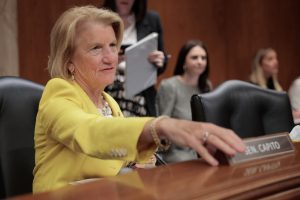Commentary: Is West Virginia ready for Capito Care?
About 522,000 West Virginians get their health insurance coverage through Medicaid, and by 2027, the largest cuts to Medicaid in history will have been ushered in by HB 1 — also known as the “big beautiful bill” — hurting a broad swath of West Virginia families across rural, urban, and suburban parts of the state.
We refer to it as Capito Care, because as West Virginia’s senior senator and one of our country’s highest ranking Republican senators, Sen. Shelley Moore Capito could have stopped these devastating cuts, but she chose not to. Even knowing that West Virginia — her constituents — stands to be one of the biggest losers. She chose not to protect or help us.
Don’t believe it when they tell you they are only going after “waste, fraud and abuse” to shore up Medicaid for the future. Medicaid has mechanisms for dealing with waste and fraud, and it represents an infinitesimal amount of overall spending.
Medicaid is actually one of the best managed government programs and is more cost-efficient than other major health programs like Medicare and private health insurance, according to the American Hospital Association. Its per-beneficiary costs have grown more slowly than private insurance costs over the long term according to the Center on Budget and Policy Priorities.
And what they don’t tell you is the fraud that is identified is typically corporate perpetrated fraud, not individuals simply trying to have access to health care.
If going after waste, fraud and abuse is truly the goal, why not implement these policies now rather than in 2027 — long after the 2026 midterm elections? I’ll tell you why — because West Virginians and Americans from every walk of life overwhelmingly dislike the health care provisions in this bill and they’re hoping we will forget.
Capito Care takes health insurance away from West Virginians and makes it more costly and difficult to enroll in Medicaid and the Affordable Care Act (ACA) — barriers that will drastically increase the rate of uninsured West Virginians.
For example, new Medicaid work requirements could leave over 110,000 West Virginians in the Medicaid Expansion population, a largely working population whose employers do not provide employer based group health care, without health coverage. It is a documented fact that 62% of West Virginians enrolled in Medicaid are working. The majority of others are either caring for a senior family member at home, are disabled themselves, or attending college or trade school.
Technical and administrative errors have been widely documented in states like Georgia and Arkansas, whose work requirements failed miserably. Harsh new work requirements will result in eligible West Virginians being denied care due to paperwork.
Moreover, Capito Care fails to continue the Enhanced Premium Tax Credits that help low and middle-income families and small business owners afford health coverage, resulting in skyrocketing premium costs for West Virginians. For example, a 60-year-old West Virginia couple making $82,000 would see their annual premiums for a benchmark plan increase from $6,970 to over $46,839. Additionally, 16,000 West Virginians could lose health coverage altogether due to the high premium costs
Capito Care will cut more than $6 billion to rural hospitals in the Mountain State over the next decade. According to national research, as many as 10 rural West Virginia hospitals and three nursing homes could be vulnerable to closure in the next several years as result of these drastic cuts.
In West Virginia, Medicaid covers 77% of residents in skilled nursing facilities; 46% of births; 45% of children; 51% of working age adults with disabilities; and 19% of Medicare beneficiaries. All told, these deep cuts to Medicaid could result in more than 200,000 West Virginians losing access to health care.
And buckle up, because our local economy will also suffer. We don’t talk about it enough, but the health care sector is the largest employer in the state of West Virginia. Who believes closing 10 rural hospitals and three skilled nursing facilities will “shore up Medicaid for future generations?”
The bottom line is: Capito Care will cause an affordability crisis. When there’s less federal funding coming in, that means fewer people are able to afford health care and cannot afford to see their doctor. Hospitals will incur more uncompensated care as sicker patients depend upon emergency rooms to treat chronic conditions. Fewer people with health coverage results in fewer jobs in the healthcare economy — which we all live in and share.
Capito Care will set off a downward economic spiral in an already struggling West Virginia economy.
Now that the bill is law, Sen. Capito and the rest of West Virginia’s congressional delegation must now fully own the consequences. They jammed it through even though West Virginians and the American people overwhelmingly disapprove of these cuts.
When our premiums spike and out-of-pocket costs soar, we’ll remember their vote. When we have fewer options for treatment, we’ll remember their vote. When our coverage is ripped away by being unaffordable, we’ll remember their vote. When the nursing home caring for our parents and grandparents becomes unaffordable or even closes, we’ll remember their vote. When the obituaries pile up because people can no longer afford the care they need to stay alive, we’ll remember their vote.
Sen. Capito and West Virginia’s congressional delegation must answer for the fallout. I won’t “get over it” as Kentucky’s senior Sen. Mitch McConnell said, and you shouldn’t either, because the consequences are too devastating and will take generations to recoup.
Originally published on July 31, 2025 by West Virginia Watch.

